The best Mediterranean herbs for oven seasoning start with four cornerstone herbs: thyme, rosemary, oregano, and bay leaf. You'll find these versatile herbs enhance everything from roasted vegetables to meats. For classic Mediterranean flavor, combine dried oregano and thyme with garlic powder, or create your own Herbes de Provence blend using rosemary, thyme, and marjoram. When using dried herbs in the oven, increase amounts by 25% to guarantee robust flavor development. Remember to store your herbs in airtight containers away from light to maintain freshness. Understanding these fundamental herbs opens the door to countless authentic Mediterranean cooking possibilities.
Essential Mediterranean Dried Herbs
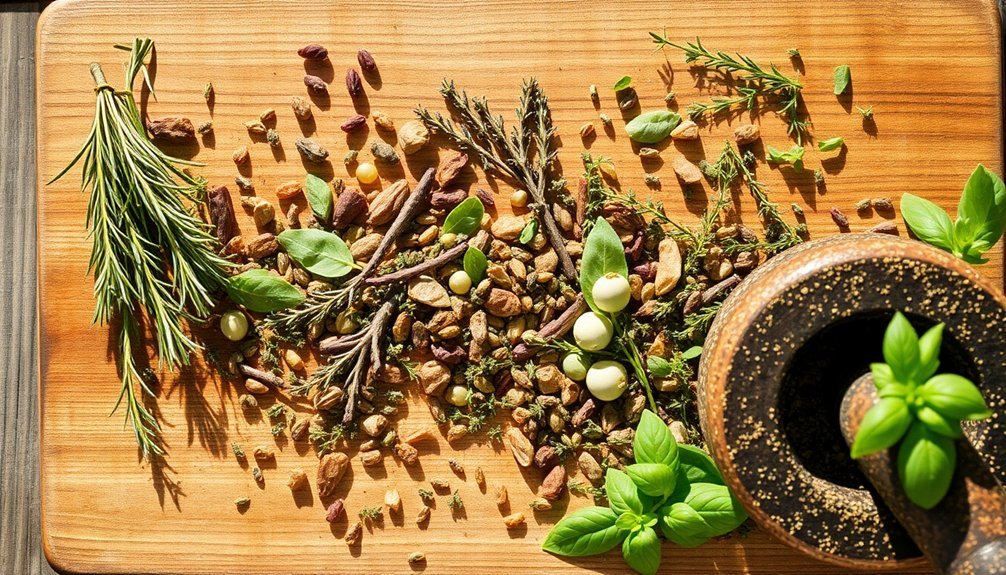
Four cornerstone herbs form the foundation of Mediterranean seasoning: thyme, rosemary, oregano, and bay leaf.
You'll find thyme's earthy, peppery notes in Italian and Greek dishes, while rosemary's sweet, aromatic profile enhances meat and vegetable recipes. Both are native Mediterranean perennials that'll transform your oven-roasted creations.
Oregano brings a slightly bitter taste and pairs wonderfully with garlic and lemon juice, making it perfect for roasted dishes. Using a 1:3 ratio when substituting dried herbs for fresh ensures optimal flavor balance.
You'll want to keep dried bay leaves on hand for their mellow, sweet flavor that complements the other herbs beautifully. These leaves work especially well in baked seafood and rice dishes.
Together, these four herbs create the authentic Mediterranean flavors you're looking for in your oven-roasted specialties.
Solar Oven Temperature Control
Managing temperature in a solar oven requires understanding different cooker types and their heat ranges. You'll need to position your oven facing the sun and adjust it every 30-45 minutes for ideal heating. For consistent temperature control, use dark cookware and monitor with a reliable thermometer. Optimal results are achieved when cooking during peak UV hours between 11 AM and 3 PM.
| Solar Oven Type | Temperature Range | Best For Herbs |
|---|---|---|
| Box-type | 160-400°F | Slow-drying herbs |
| Parabolic | 300-800°F | Quick herb roasting |
| Panel | 200-300°F | Gentle herb drying |
| Handcrafted | Varies | Light dehydration |
| Hybrid | 150-500°F | Multiple methods |
To maintain steady temperatures, you'll want to insulate your oven properly using materials like newspaper or fiberglass. Don't forget to preheat for an hour before cooking, and keep temperatures above 180°F for food safety. Use reflective panels to boost heat concentration and choose a wind-protected spot.
Citrus and Mediterranean Flavors
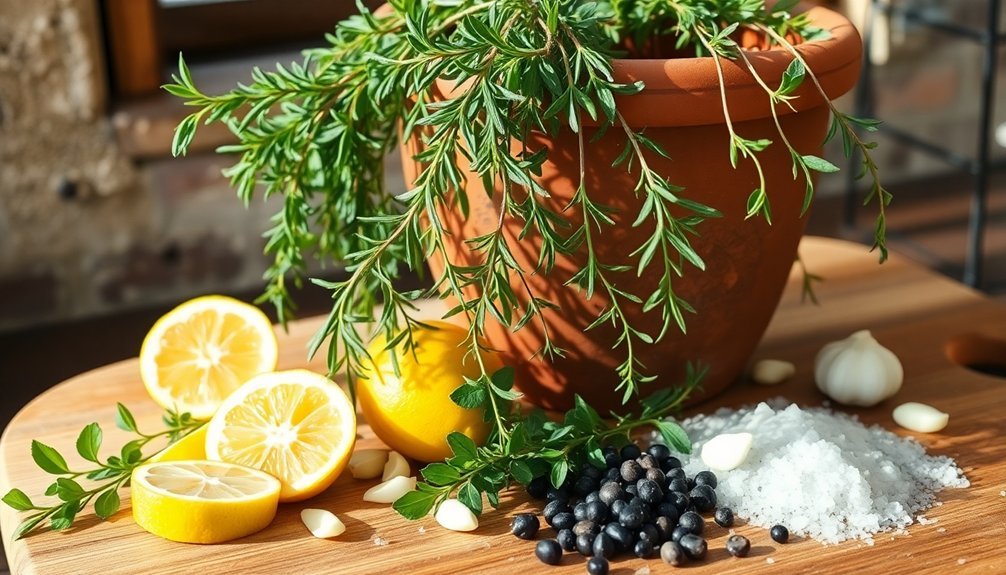
Mediterranean cooking comes alive with the vibrant combination of fresh herbs and citrus flavors.
You'll find that herbs like basil, oregano, and thyme form the backbone of these distinctive seasonings, while mint and dill add brightness when paired with citrus elements.
To create the perfect oven seasoning, you can combine these herbs with complementary spices like coriander, which adds a warm citrusy note, or cumin for earthiness. When mixing your seasonings, remember they will stay fresh one month when stored properly in an airtight container.
For a foolproof approach, try using classic blends like Herbes de Provence or a Mediterranean herb mix that includes garlic, paprika, and salt.
These combinations work exceptionally well when you're roasting vegetables or preparing meats in the oven.
You'll notice how these herbs intensify during cooking, infusing your dishes with authentic Mediterranean character.
Seasoning Ratios for Solar Cooking
When you're using solar cooking methods, you'll need to adjust your Mediterranean herb ratios to account for the lower and more variable temperatures compared to conventional ovens.
To maintain flavor intensity in solar cooking, increase dried herbs by roughly 25% while keeping ground spices at standard amounts since they're less affected by gentle heat.
Your herb-to-spice balance should lean heavily on heat-stable ingredients like dried oregano and thyme, which can withstand longer cooking times without becoming bitter. For traditional Mediterranean dishes, adding freshly ground spices just before serving helps preserve their aromatic qualities and enhances the overall flavor profile.
Solar Temperature Control Tips
Success with solar cooking relies heavily on maintaining precise temperature control while adapting your seasoning ratios. You'll need to monitor your solar oven's temperature carefully, aiming for 150-225°F to guarantee your Mediterranean herbs release their finest flavors.
Position your oven directly facing the sun and adjust it every 30-45 minutes to maintain consistent heating.
For the best results with herb-seasoned dishes:
- Preheat your solar oven for 20-30 minutes before adding your herbed preparations
- Use dark, lidded cookware to maximize heat absorption and retain the herbs' aromatic compounds
- Cook between 10:00 a.m. and 2:00 p.m. when sun intensity helps release essential oils from your herbs
Shield your cooking area from wind to prevent temperature fluctuations that could affect how your seasonings develop their flavors.
Herb Ratios for Heat
Getting your herb ratios right in solar cooking makes a significant difference in your final dish's flavor profile.
You'll want to start with a foundation of 2 parts each of oregano and thyme, combined with 1 part each of rosemary and basil. This creates a balanced Mediterranean blend that can withstand high temperatures.
To enhance your seasoning mix, add 1 teaspoon each of cumin, coriander, and paprika. Include 1-2 teaspoons of both garlic and onion powder for robust flavor.
You can also incorporate lemon peel for brightness. Remember to adjust salt and black pepper to taste.
These proportions work particularly well in solar cooking because they maintain their flavor integrity under heat while creating a harmonious blend of Mediterranean tastes that complement various dishes.
Mediterranean Mix Adjustments
Crafting the perfect Mediterranean seasoning blend for solar cooking requires strategic adjustments to traditional ratios.
When using solar ovens, you'll want to intensify certain herbs while moderating others to compensate for the gentle cooking process.
- Double your core herbs (oregano and basil to 4 tbsp each) to guarantee robust flavor development during slower cooking times.
- Increase aromatic elements by adding an extra teaspoon each of garlic granules and smoked paprika to enhance depth.
- Reduce salt content to 1/2 tsp since solar cooking naturally concentrates flavors.
For the best results, mix your adjusted blend thoroughly and store it in an airtight container.
You'll find that these modified proportions work particularly well with vegetables, lean proteins, and grain dishes prepared in your solar oven.
Traditional Spice Combinations
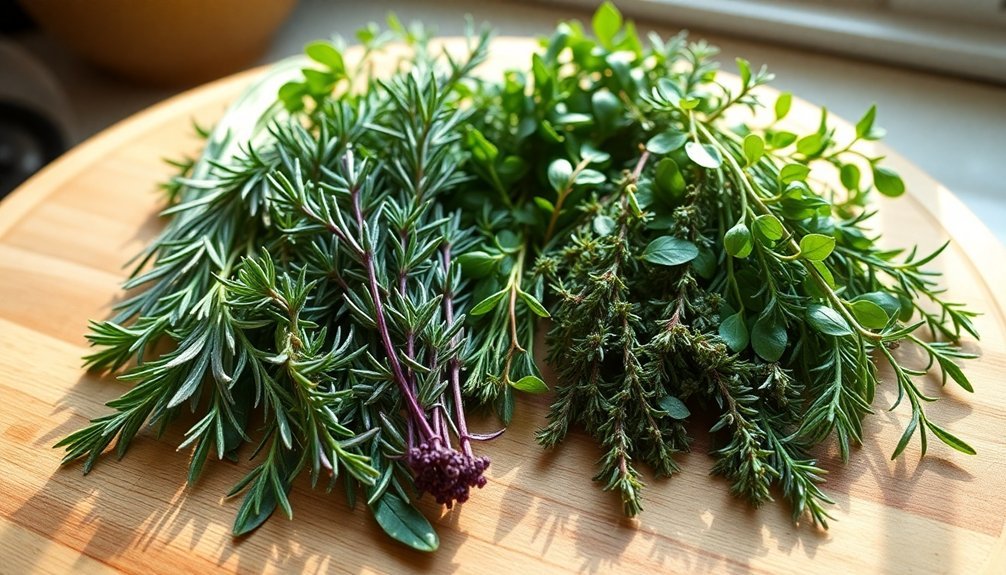
When you're ready to explore Mediterranean seasonings, you'll find three distinct regional approaches worth mastering.
Classic Greek blends typically feature oregano and garlic powder as their foundation, while Italian combinations lean heavily on basil, thyme, and rosemary.
For authentic Provençal flavors, you'll want to combine thyme, rosemary, and marjoram with a touch of lavender, creating the signature herbs de provence profile that's perfect for oven roasting.
Classic Greek Herb Blends
Three key elements define traditional Greek herb blends: oregano's earthiness, basil's minty notes, and dill's zesty punch.
You'll find these core herbs working together with parsley and thyme to create that distinctive Mediterranean flavor profile. To enhance the blend, you'll want to incorporate complementary spices like garlic powder, onion powder, and black pepper.
- Mix warm spices sparingly – a touch of cinnamon and nutmeg adds depth without overpowering.
- Store your blend in an airtight container away from light to maintain freshness for up to 6 months.
- Grind ingredients to your preferred texture – coarser for rustic dishes, finer for smooth sauces.
This versatile seasoning works beautifully on everything from roasted vegetables to grilled meats, making it your go-to Mediterranean flavor enhancer.
Italian Seasoning Combinations
Five essential herbs form the backbone of authentic Italian seasoning: basil, oregano, parsley, rosemary, and thyme.
You'll find basil and oregano bringing their signature flavors, while parsley adds subtle earthiness. Rosemary contributes piney notes, and thyme rounds out the blend with robust earthiness.
To create your own blend, combine 1-2 tablespoons each of basil, oregano, and parsley with 1 tablespoon of rosemary and 1-2 teaspoons of thyme.
You can customize your mix by adding optional ingredients like marjoram, garlic powder, red pepper flakes, sage, or onion powder.
Store your finished blend in an airtight glass jar in a cool, dry place, where it'll keep for up to six months.
This versatile seasoning works perfectly in pasta sauces, marinades, soups, and stews.
Provençal Spice Pairings
Moving from Italy's herb gardens to the sun-drenched fields of Provence, you'll discover a distinctive blend known as herbes de Provence. This aromatic mixture combines earthy thyme, pine-scented rosemary, and sweet marjoram as its foundation, while ingredients like fennel seed and tarragon add complexity.
To make the most of your herbes de Provence blend, consider these key applications:
- Create a flavorful dry rub by combining the herbs with olive oil before coating your chicken, fish, or pork.
- Transform roasted vegetables by tossing them with the herb mixture before they go into the oven.
- Enhance traditional Provençal dishes like ratatouille and tapenade by incorporating this blend during cooking.
For best results, store your dried herbs in an airtight container and consider toasting whole seeds before grinding.
Mediterranean Vegetable Roasting Tips
Successful Mediterranean vegetable roasting depends on a combination of proper seasoning, temperature control, and technique.
You'll want to cut your vegetables uniformly and spread them evenly on your baking sheet, avoiding overcrowding to guarantee proper air circulation. For best results, roast at 400-425°F.
Select a colorful mix of seasonal vegetables like zucchini, bell peppers, eggplant, and cherry tomatoes.
Season them generously with Mediterranean herbs such as oregano, thyme, and sumac. These herbs complement each other perfectly, with oregano and thyme providing savory depth while sumac adds a bright, tangy note.
You can finish your roasted vegetables with fresh basil and a drizzle of olive oil. They'll pair beautifully with proteins like flank steak or transform into a vegetarian meal when served over lentils.
Herb Storage Methods
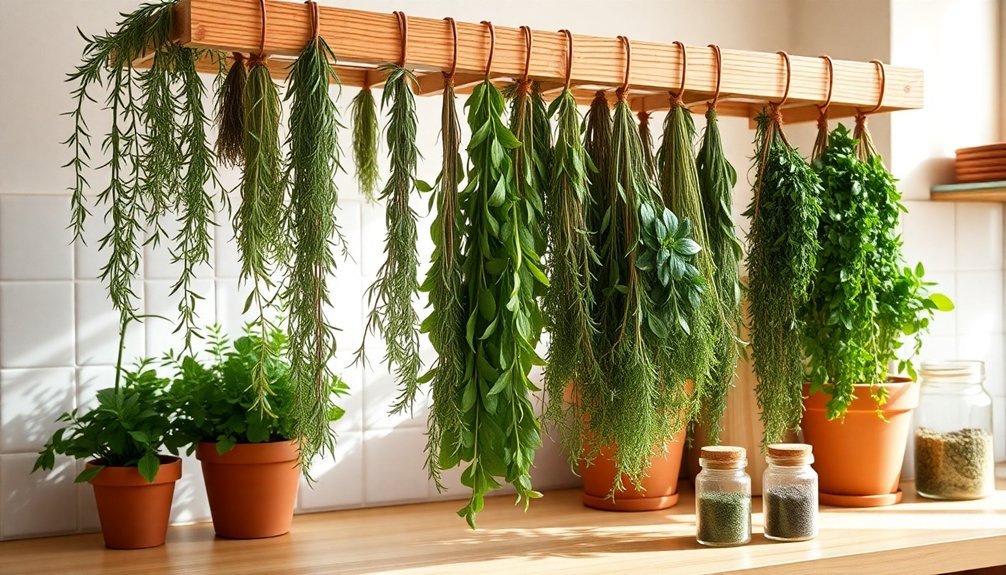
Proper storage of Mediterranean herbs can dramatically extend their shelf life and preserve their robust flavors.
You'll want to choose the best storage method based on how quickly you'll use your herbs and the space available in your kitchen.
For maximum freshness and convenience, try these proven storage approaches:
- Keep basil on your counter in a water-filled container away from direct sun, and cover with a plastic bag to maintain moisture.
- Store other fresh herbs like rosemary and thyme in the refrigerator between damp paper towels in a sealed plastic bag.
- Freeze herbs in oil-filled ice cube trays for long-term storage, perfect for dropping directly into your roasted Mediterranean dishes.
Remember to label your stored herbs with dates and change water every few days when using the container method.
Solar Oven Seasoning Techniques
You'll need to manage temperature fluctuations in your solar oven by adjusting its position every 10-15 minutes while herbs like basil and oregano infuse your dishes with Mediterranean flavors.
During peak sunlight hours, herbs release their essential oils more readily, so you can use less seasoning than traditional recipes might suggest.
To prevent excess moisture from diluting the herbal flavors, keep your solar oven's reflective surfaces properly angled and maintain consistent heat by avoiding shadowy spots.
Solar Temperature Control Tips
Getting the right temperature in a solar oven requires careful attention to positioning and monitoring.
You'll want to preheat your solar oven for about 20 minutes in strong sunlight to reach 300°F before adding your Mediterranean herbs for seasoning. Track internal temperatures using a digital probe thermometer, aiming for 150-225°F for ideal herb infusion.
For the best temperature control when seasoning with herbs:
- Adjust your oven's position every 30-45 minutes to follow the sun, ensuring maximum heat retention.
- Use dark, lidded cookware to maintain consistent temperatures while your herbs release their oils.
- Regulate heat by opening the glass lid briefly or slightly turning the oven away from direct sunlight if temperatures climb too high.
Keep reflective panels properly aligned to maintain steady temperatures throughout the seasoning process.
Herb Infusion During Sunlight
Successfully infusing Mediterranean herbs in a solar oven requires careful timing and ideal sunlight conditions.
You'll want to start by selecting potent Mediterranean herbs like oregano, thyme, rosemary, and basil, filling your jar about ¼ to ½ full. For precise measurements, use 1 ounce of dried herbs for every 10 ounces of oil.
Place your chosen herbs in a clean jar, making sure they're completely submerged in oil.
While traditional solar infusion takes 4-6 weeks, you can speed up the process using your oven's residual heat for 3-4 hours. Remember to seal the jar tightly and shake it periodically to enhance the infusion.
Once complete, strain the herbs and store your infused oil in an airtight container away from direct sunlight to maintain its Mediterranean flavors.
Moisture Management While Cooking
While solar ovens offer an eco-friendly cooking method, managing moisture levels is crucial for achieving ideal results with Mediterranean seasonings. You'll need to monitor your herbs carefully and adjust cooking techniques to prevent excess moisture from diluting their flavors.
- Keep the lid slightly ajar during final cooking stages to allow steam to escape, particularly when using moisture-rich herbs like basil or oregano.
- Place your seasoned dishes in preheated ovens to guarantee even distribution of herb flavors and prevent unwanted condensation.
- Avoid overcrowding your cooking pot, as this can trap moisture and weaken the potency of Mediterranean herbs.
When using oil-based ingredients like sun-dried tomatoes or preserved lemons, they'll help control moisture while intensifying the herbal seasonings.
Remember to stir periodically to distribute both moisture and flavors evenly throughout your dish.
Fresh Versus Dried Herbs
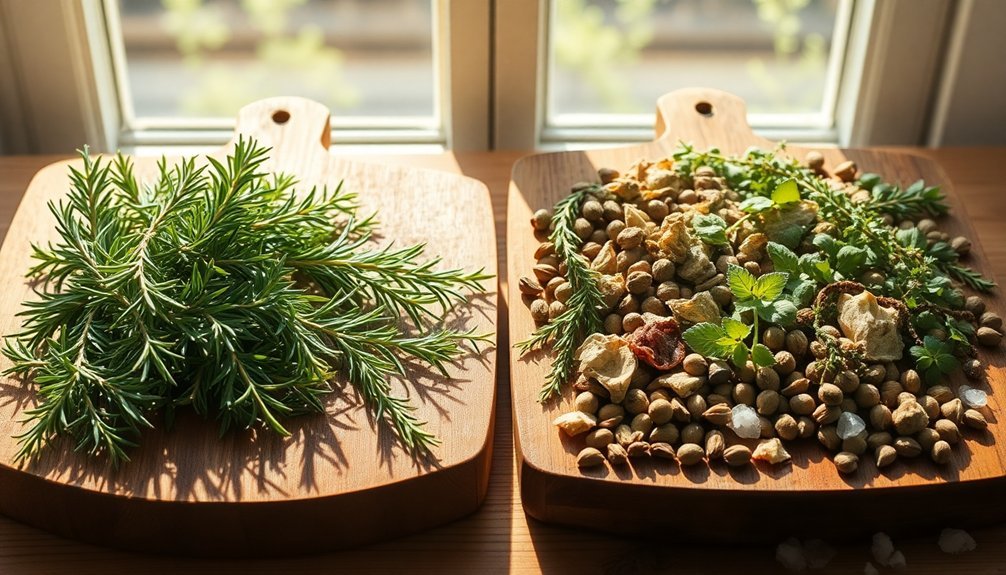
Understanding the distinctions between fresh and dried herbs can dramatically impact your Mediterranean cooking results. Fresh herbs burst with bright, dynamic flavors and work best when added at the end of cooking or as garnishes. They'll give your dishes that vibrant, fresh-from-the-garden taste. Dried herbs, concentrated and intense, excel in long-cooking dishes where they slowly release their flavors.
| Aspect | Fresh vs. Dried |
|---|---|
| Timing | Fresh: End of cooking / Dried: Beginning of cooking |
| Storage | Fresh: 1-2 weeks refrigerated / Dried: Up to 1 year |
| Potency | Fresh: Use 3x more / Dried: Use 1/3 amount |
For Mediterranean oven dishes, you'll often want to combine both types – dried herbs early in the cooking process for depth, and fresh herbs just before serving for brightness and visual appeal.
Regional Mediterranean Spice Variations
The rich tapestry of Mediterranean cooking reveals distinct regional spice combinations that have evolved over centuries of cultural exchange.
You'll find oregano, thyme, and rosemary dominating Italian and Greek dishes, while sumac and za'atar bring bold flavors to Middle Eastern cuisine.
North African influences introduce warm notes of cumin, coriander, and paprika.
For your best Mediterranean-style oven seasonings, consider these regional approaches:
- Southern European: Mix dried oregano, rosemary, and bay leaves for roasted meats and vegetables
- Middle Eastern: Combine sumac, thyme, and sesame seeds for a za'atar-inspired blend
- North African: Blend paprika, cumin, and coriander for a warm, aromatic seasoning
Each region's signature spice combinations offer unique ways to transform your oven-roasted dishes into authentic Mediterranean delights.
Herb Grinding Practices
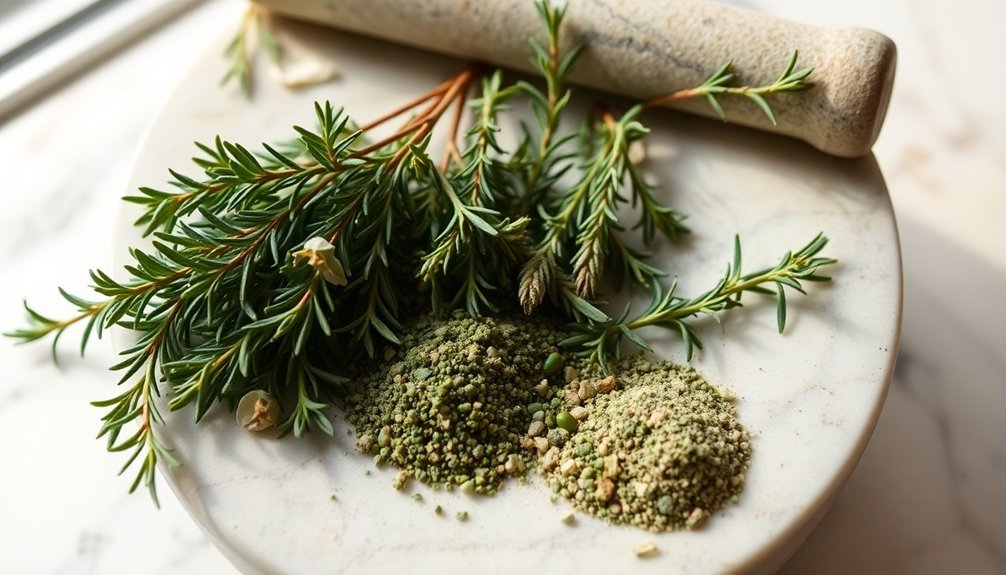
Mastering herb grinding techniques can greatly elevate your Mediterranean seasonings. You'll get the best results using a mortar and pestle, which releases more aromatic oils than electric grinders through its stone-to-stone action. This traditional method helps burst the herb's cell walls, maximizing flavor in your oven dishes.
Before grinding, you'll want to toast your whole seeds in a dry skillet, shaking the pan to prevent scorching. This simple step intensifies their flavors considerably.
When you're ready to grind, work in small batches to guarantee freshness. Don't grind more than you'll use within a month, as ground herbs lose their potency quickly. Store any leftover ground herbs in airtight containers, though you'll achieve the most vibrant seasonings by grinding just before use.
Seasoning Application Methods
Properly applying Mediterranean seasonings transforms ordinary dishes into aromatic masterpieces. You'll find these versatile herb blends work wonderfully on meats, vegetables, and various other dishes. For delicate foods like fish, use a finer texture to avoid overwhelming the natural flavors.
- For meats: Rub the seasoning directly onto chicken, pork, or beef before cooking, allowing the herbs to infuse during the roasting process.
- For vegetables: Toss with olive oil and seasonings before grilling or roasting, or sprinkle on steamed veggies just before serving.
- For soups and stews: Add herbs during cooking to develop deeper flavors, especially in bean, lentil, or seafood dishes.
Don't forget to incorporate these seasonings into marinades, dips, and sauces for an extra Mediterranean touch.
Solar Oven Timing Adjustments
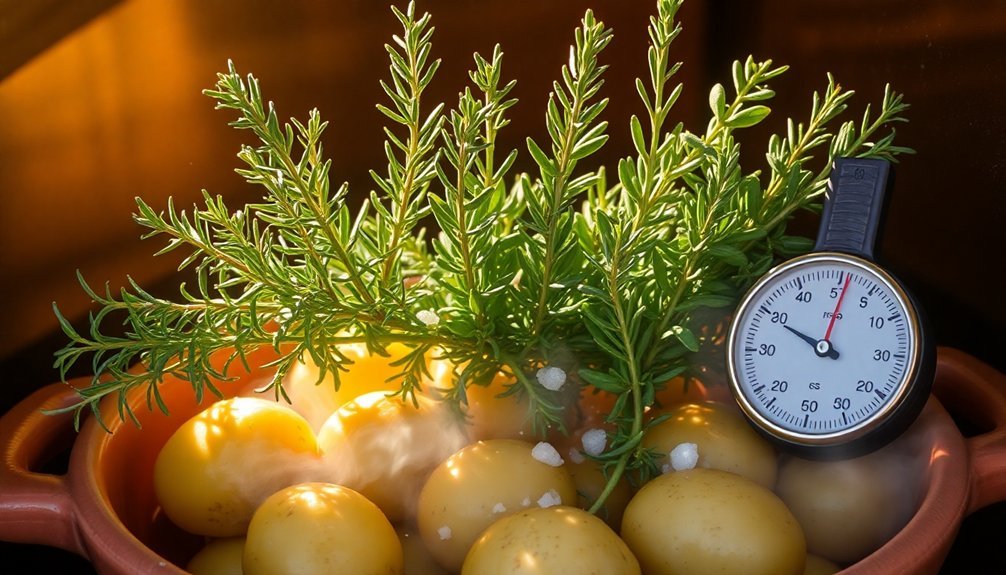
When cooking with a solar oven, you'll need to adjust standard recipe times to account for lower and fluctuating temperatures. Most dishes will take considerably longer than in conventional ovens, with recipes like Mediterranean gressins requiring about 90 minutes and ratatouille needing 4-5 hours at 200-250°F.
You'll want to keep your herbs' flavors intact by maintaining consistent temperatures. Regularly refocus your oven to follow the sun's position, and avoid opening the lid too frequently, as this extends cooking time.
If you can't achieve the ideal 350°F temperature, aim for 250-300°F and extend your cooking duration accordingly. Using dark-colored, covered pots will help maintain steady heat and guarantee your Mediterranean herbs infuse properly into your dishes.
Frequently Asked Questions
Can Mediterranean Herb Seasonings Trigger Allergic Reactions in Sensitive Individuals?
Yes, you can experience allergic reactions to Mediterranean herbs, including skin rashes, respiratory issues, and even anaphylaxis in rare cases. Be careful if you're sensitive to pollens or have known spice allergies.
How Do Mediterranean Herbs Affect the Cooking Time of Proteins?
When you're cooking proteins, Mediterranean herbs won't notably change your cooking time. They'll enhance flavor and moisture retention, and while they may help with browning and heat distribution, cooking duration remains largely unaffected.
Are There Child-Friendly Mediterranean Herb Combinations That Aren't Too Strong?
You'll find basil, oregano, and parsley are perfect kid-friendly Mediterranean herbs. Start with small amounts and mix them into familiar dishes. They're mild enough for children but still add great flavor.
Do Mediterranean Herbs Lose Their Potency When Cooked With Acidic Ingredients?
Yes, you'll notice some herbs lose potency with acidic ingredients. While rosemary and thyme stay fairly stable, basil and dill are more sensitive. Try adding delicate herbs later in cooking to preserve their flavors.
Which Mediterranean Herbs Should Be Avoided During Pregnancy?
You'll want to avoid oregano tea and essential oil, basil essential oil, and Korean ginseng during pregnancy. While you can use oregano and basil as condiments, consult your healthcare provider about herbal remedies.
In Summary
You'll find Mediterranean herbs like oregano, thyme, rosemary, and sage work beautifully in solar oven cooking. They're robust enough to withstand longer cooking times while maintaining their flavor profiles. Remember to adjust your typical ratios when using dried herbs, as they're more concentrated than fresh ones. Don't forget to store your herb blends in airtight containers away from sunlight to preserve their potency for future solar cooking adventures.
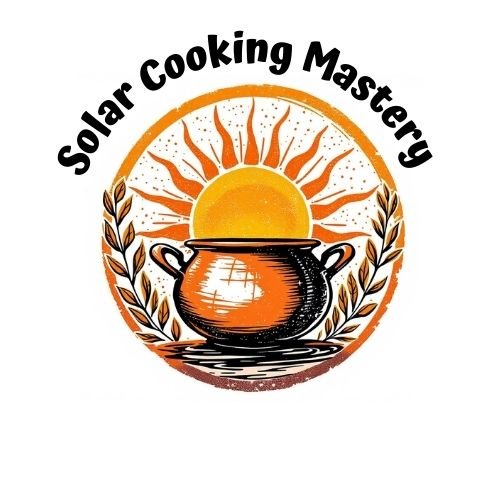
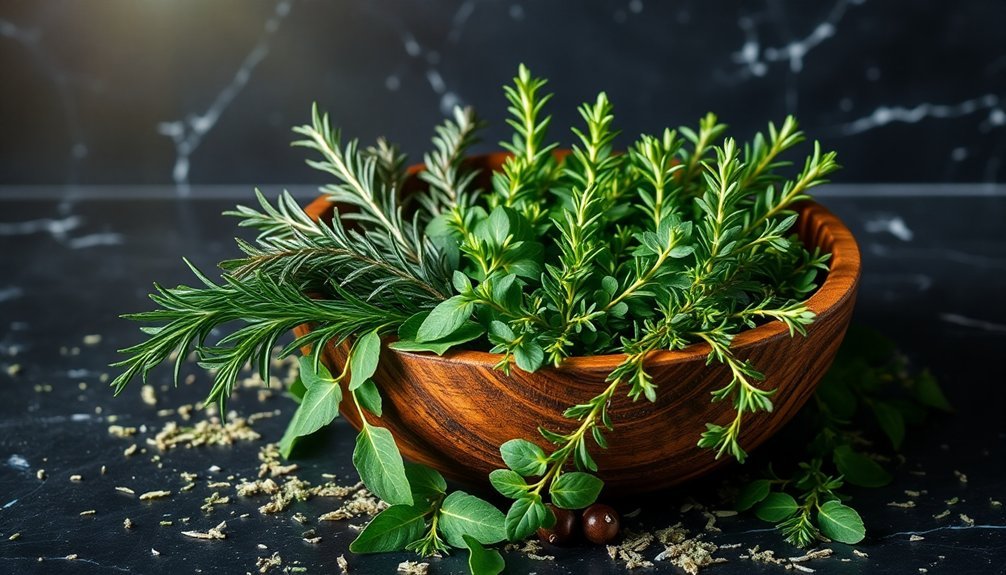
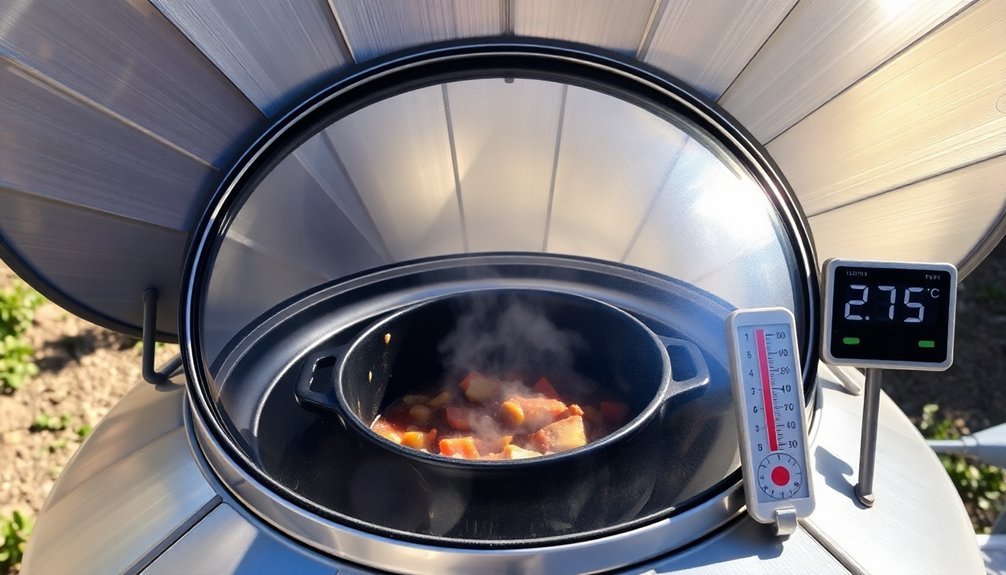
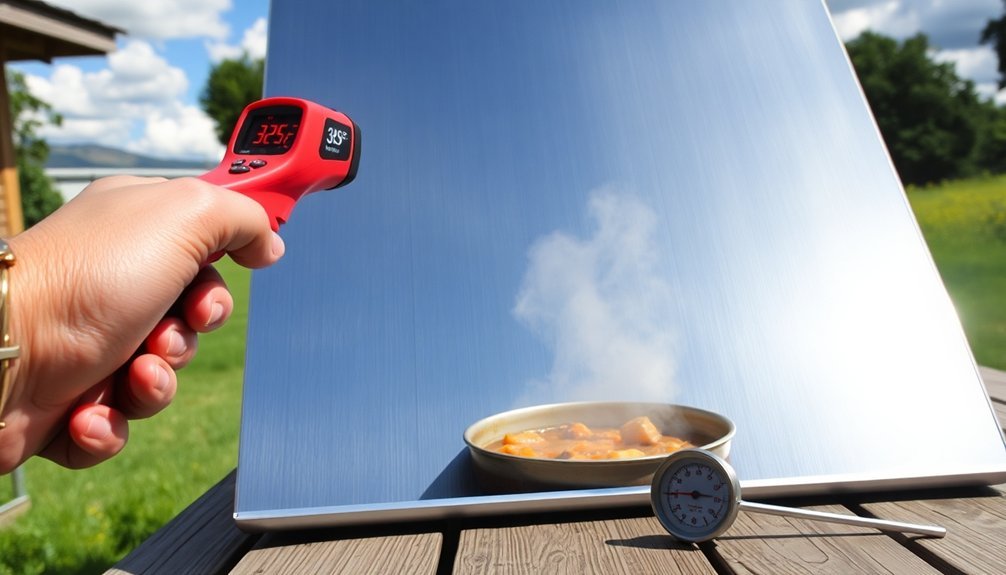
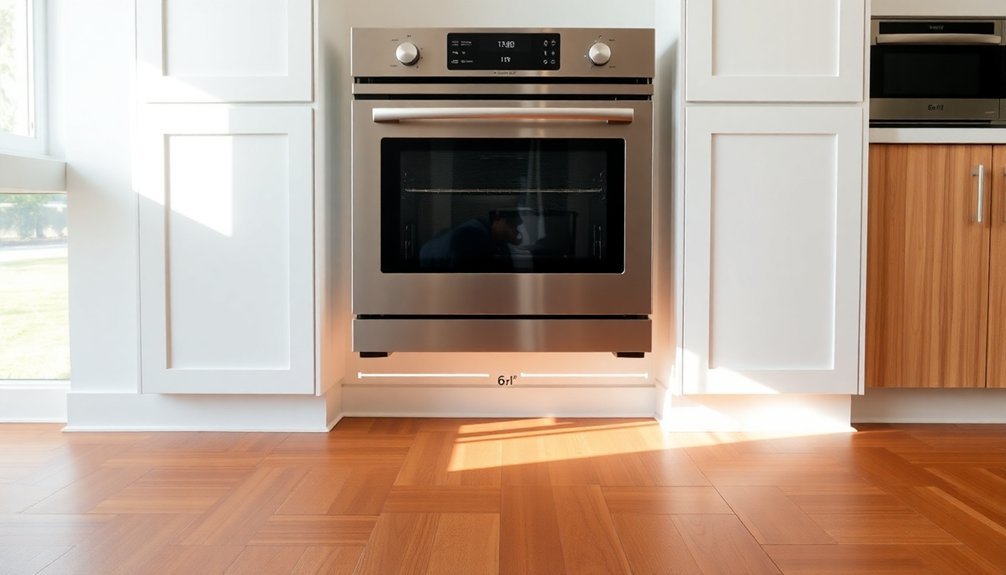
Leave a Reply